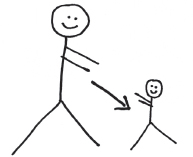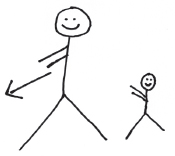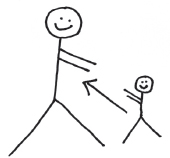Excerpt from the excellent book
The Truth: An Uncomfortable Book About Relationships by Neil Strauss
Bonding Parent
They say here that there are three ways of raising children. The first is functional bonding, in which the parents or primary caregivers love, nurture, affirm, set healthy limits with, and take care of the needs of the child. I turn over my timeline and sketch it for her:

This creates a child who has healthy, secure self-esteem and relationships.
Neglecting Parent > Love Addict
But then there’s neglect, when a caregiver abandons, is detached from, or doesn’t appropriately nurture the child. This can range from a parent who isn’t physically present, to a parent who is physically present but emotionally distant, to a parent who doesn’t provide adequate care or safety, to a parent lost in a work, sex, gambling, alcohol, or other addiction. If you grew up feeling unwanted by or unimportant to a parent, this is a sign that neglect likely occurred:

This creates wounded children, who are often depressed and indecisive, see themselves as flawed and less valuable than others, and feel they can’t face the world alone. In relationships, they tend to have what’s called anxious attachment. They may feel like they’re not enough for their partners; become so wrapped up in their relationships that they lose sight of their own needs and self-worth; and be emotionally intense, passive-aggressive, or in need of constant reassurance that they’re not being abandoned. Here, they call this type of person a love addict.
Enmeshing Parent > Love Avoidant
Instead of taking care of a child’s needs, the enmeshing parent tries to get his or her own needs met through the child. This can take various forms: a parent who lives through a child’s accomplishments; who makes the child a surrogate spouse, therapist, or caretaker; who is depressed and emotionally uses the child; who is overbearing or overcontrolling; or who is excessively emotional or anxious about a child. If you grew up feeling sorry for or smothered by a parent, this is a sign that enmeshment likely occurred:

In the process, enmeshed children lose their sense of self. As adults, they usually avoid letting anyone get too close and suck the life out of them again. Where the abandoned are often unable to contain their feelings, the enmeshed tend to be cut off from them, and be perfectionistic and controlling of themselves and others. Though they may pursue a relationship thinking they want connection, once they’re in the reality of one, they often put up walls, feel superior, and use other distancing techniques to avoid intimacy. This is known as avoidant attachment—or, as they put it here, love avoidance. And most sex addicts, according to this theory, are love avoidants.